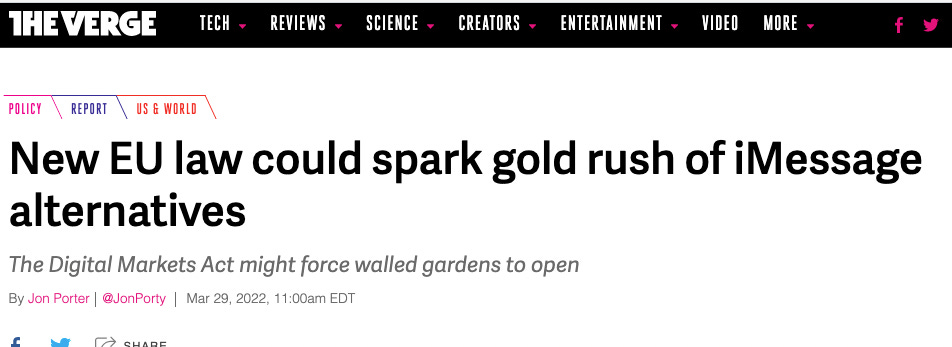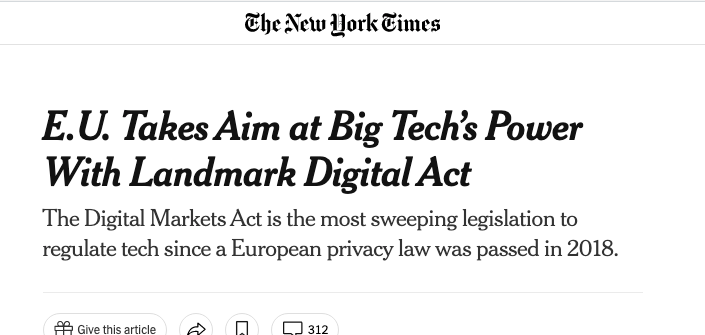Big Tech and the Beautiful Losers in Europe
Margrethe Vestager gets a lot of headlines, but without results. It's time to stop taking her quest for headlines seriously, and to focus on whether there will be any impact from the new law.
Welcome to BIG, a newsletter on the politics of monopoly power. If you’d like to sign up to receive issues over email, you can do so here.
There’s a lot of hoopla about the Digital Markets Act in Europe, which is a law that the European Commission, the European Parliament, and European Council all settled on last week. This law is supposed to do something about big tech’s ‘dominance,’ and here are a bunch of headlines saying as much.
These articles contain a bunch of details about what the DMA could do, like how this law establishes gatekeeper status and imposes interoperability mandates. Supposedly, Facebook’s Messenger and WhatsApp will have to open up, there will be limits on targeted advertising, and Google won’t be able to preference its own services. But are any of these ideas realistic or well-written? How likely is this law to matter? Are the headlines correct? Or should we be more skeptical? The following statement by a key enforcer suggests that the headlines are quite misleading, and caution is warranted.

Pierre Régibeau is the head economist for the office that will be enforcing this law, known as DG Competition, and he’s already signaling that his office won’t be doing very much. Why would Régibeau immediately splash cold water on the DMA, which is ostensibly so important? As in the U.S., there’s a war within the elites in Europe. The European Parliament wants to break up big tech, because they are elected and are more in touch with the public. But a lot of Europeans ensconced in bureaucratic positions are similar to the worst actors in the Democratic Party in terms of their instincts. They love busywork, they want headlines without accomplishments, and they are obsessed with technocratic economics.
It’s not just Régibeau who has these instincts. His boss, Margrethe Vestager, who runs the antitrust commission in Europe, seems to have them as well. A good example Vestager’s style is her work on Google. Since 2009, there has been a case based on a shopping search engine, Foundem, which was ruined by Google’s self-preferencing of its own product. In 2017, Vestager fined Google for doing that, but didn’t do anything else to remedy the market. Finally, last year, the European high court upheld the fine, in what was framed as a ‘major win.’ Except, it wasn’t. A 12 year case ending in a parking ticket for Google after Google monopolized a market is a failure. But she did get lots of headlines in the meantime for supposedly being ‘tough.’
When it comes to dominant firms, Vestager issues large fines, but opposes on an ideological level meaningful structural changes. Here she is a few years ago, for instance, attacking Elizabeth Warren’s plan to split apart big tech firms.
We’re dealing with private property, businesses that are built and invested in and become successful because of their innovation. So to break up a company, to break up private property, would be very far-reaching. And you would need to have a very strong case that it would produce better results for consumers in the marketplace than what you could do with sort of more mainstream tools.
This comment wasn’t widely noticed, because the media has a ‘tough Vestager’ narrative going on, and actually looking at the details of what she thinks and how she acts cuts against this narrative. But this comment, with its strong Robert Bork-influenced technocratic and consumer welfare-oriented frame, reflects her views.
Unfortunately, Vestager is the person enforcing the new Digital Markets Act. Now, I’ve read the DMA, and it’s a pretty expansive but vague law, because the European Competition Authority isn’t very knowledgeable about big tech, in contrast to the British and Australians, who have done expansive studies to understand how online advertising, search, and communication markets actually work.
Writing a tight law with clear definitions is actually really hard, and takes a deep understanding of what you’re trying to regulate. The Hepburn Act of 1906 that broke apart railroads was insanely detailed, the House and Senate knew where every rail line went and what it carried, and they proscribed clear rules as a result. The Australian law that forces big tech to pay journalists - which is working so well that one professor “says she can’t persuade many students to take internships these days because it’s so easy for them to land full-time jobs” - is similarly detailed.
The vagueness of the Digital Markets Act reflects the frustration of the European Parliament that wants action but doesn’t have the knowledge to write clear rules. Vagueness is ok if you’ve got assertive enforcers at the helm, but unfortunately, the EU Competition Authority is staffed by people like Vestager and under her, men like Régibeau.
Moreover, the Europeans could have written a law to disburse authority, recognizing Vestager’s failure. After all, Europe isn’t just a union, it is composed of countries, each of which has antitrust enforcers and parliaments. There are some great enforcers in Europe, like the German Andreas Mundt. Unfortunately, the DMA also preempts national authorities or legislatures from addressing competition problems with regards to big tech (though there are likely loopholes.)
The DMA will be deployed through a robust supervisory architecture, under which the Commission will be the sole enforcer of the rules, in close cooperation with authorities in the EU Member States.
Alas.
One very clear consequence of this law is that lawyers are going to get rich writing compliance reports that big tech firms will submit to various bureaus in Europe. Beyond that, I’m genuinely uncertain, because there could be impacts. I hope a few cases come out of it, like an action to stop self-preferencing in local search, or maybe something on adtech. But I won’t believe it until it happens. I’ve watched Vestager and the Europeans long enough to know that headlines about coming toughness on competition policy don’t always reflect market and legal realities. And while I already put this piece of evidence earlier in the post, I think this is the key piece of evidence suggesting skepticism is the right approach, and it is worth reiterating.

That said, fights within the institutions are inevitable, and so the DMA can be seen as a pivot point where European bureaucrats and courts are put on the spot to act. In that sense, it’s good. Still, changing laws without swapping out weak enforcers like Vestager is always going to cause problems. In the U.S., we have gone the opposite route, putting in place strong enforcers like Jonathan Kanter and Lina Khan before changing antitrust laws. I think that’s a better approach. I’m an optimist, and I want to think the best of the DMA. But I’m just not going to claim any sort of victory here, until I see more.







Though somewhat tangential, I would argue that the Australian journalism law is not really a solution. Read a little Matt Taibbi and Glenn Greenwald to see just how toxic main stream journalism can be. (Though I think you already know quite well.) Diverting money to them as a "subsidy" has a lot of the characteristics of a kick-back. I am NOT comforted by the "mere statistic" that it is easier for *students* (in the generic) to get journalism jobs.
I say this fully aware of the dire situation for independent, competent journalists. I care about it. I've tried to come up with ways for people like Matt Stoller to more easily fund his work. The problem is that the goal can't be simply "push more money into journalism," it has to be change financial incentives so that there are more important drivers of revenue than targeted advertising.
As a tecchnologist I'd say it all comes down to how well DMA is enforced, it sounds like just about everything I'd ask for from politicians. We need knowledgable technologists who value privacy and competition at the helm of this enforcement, or it could easily backfire.